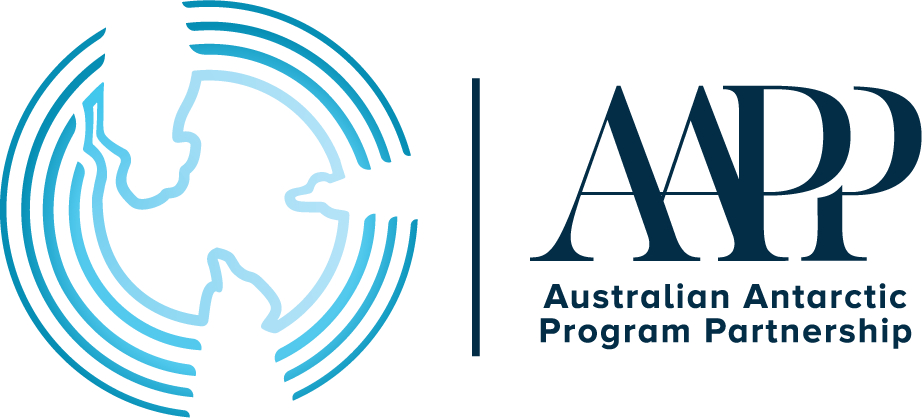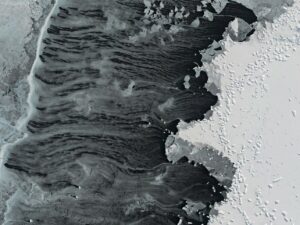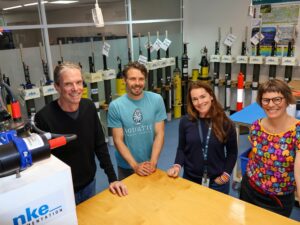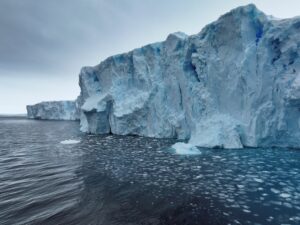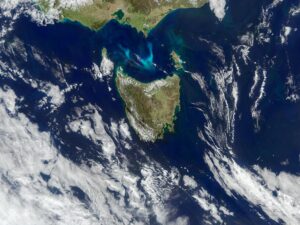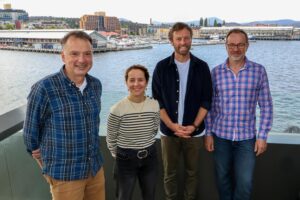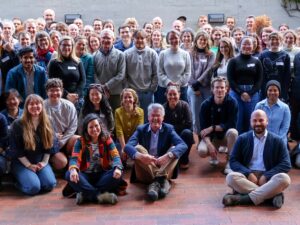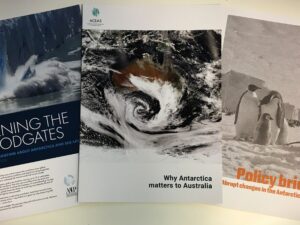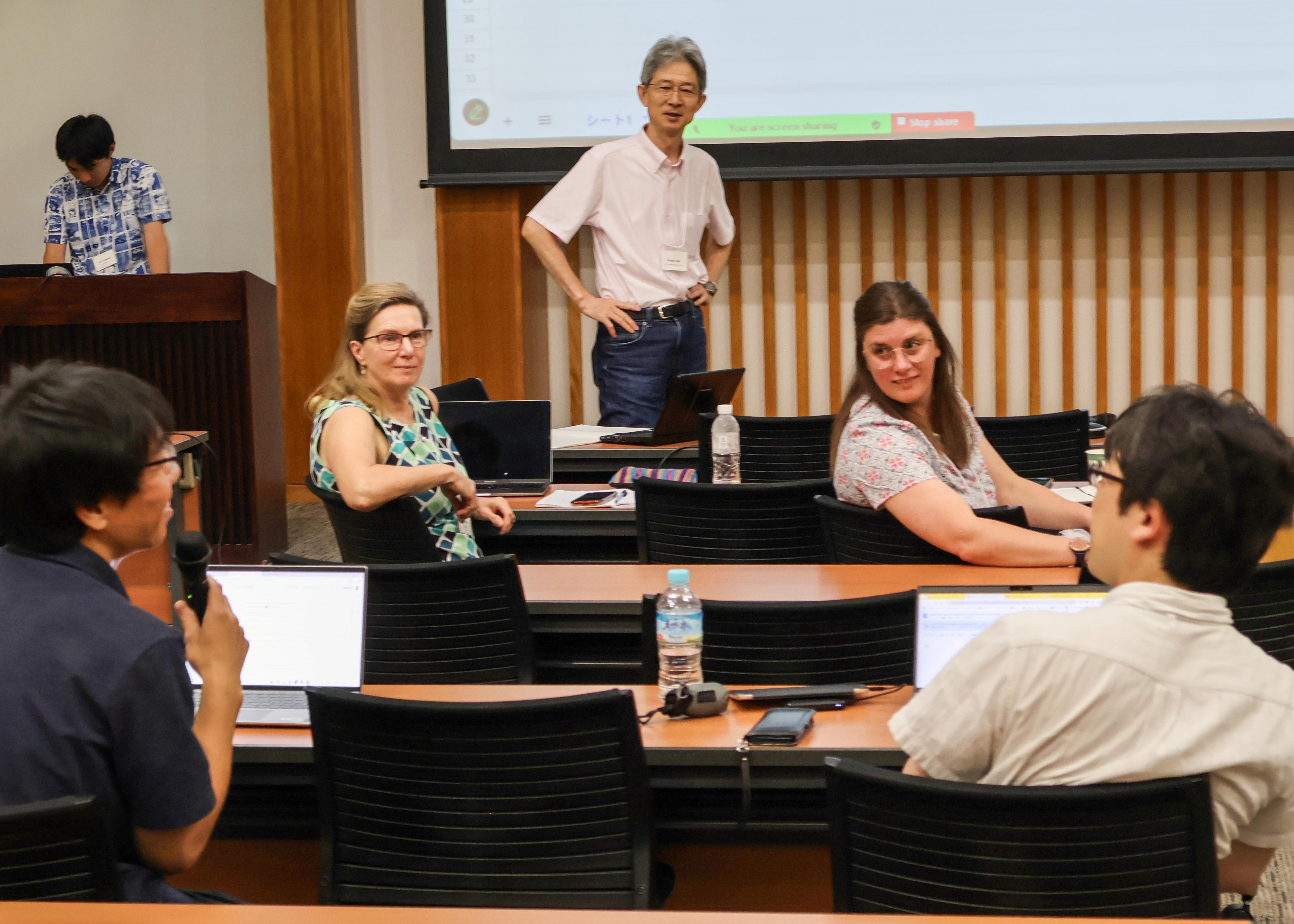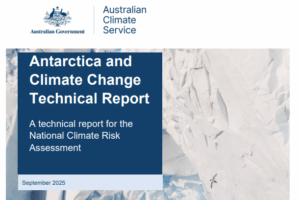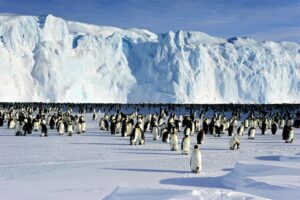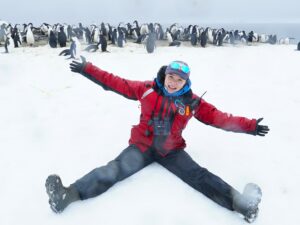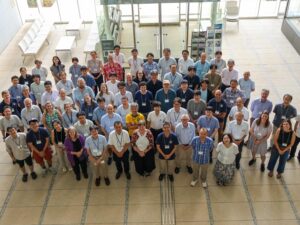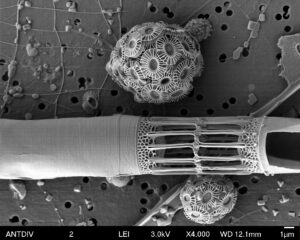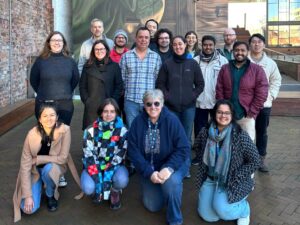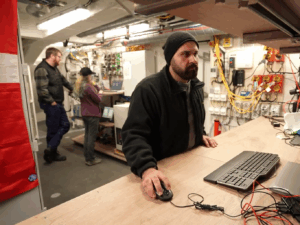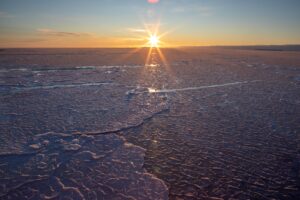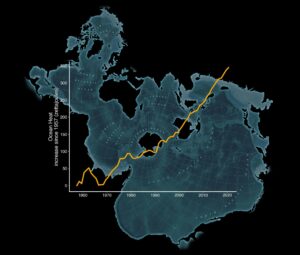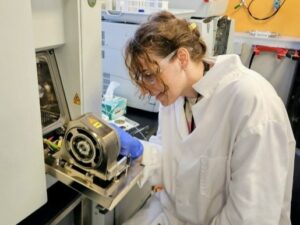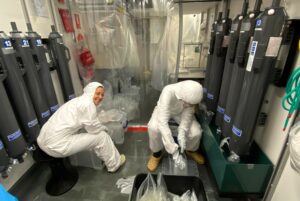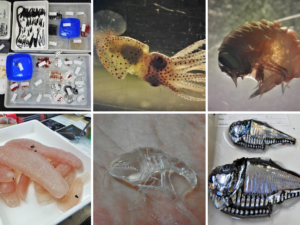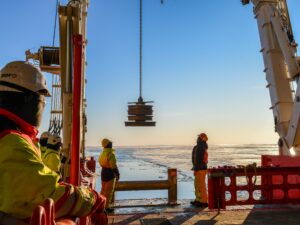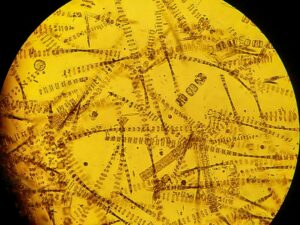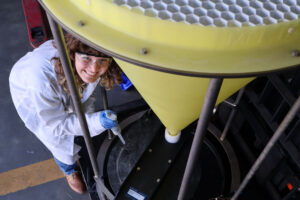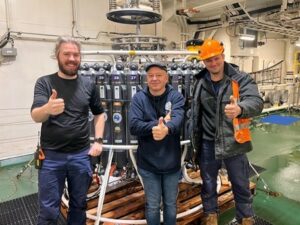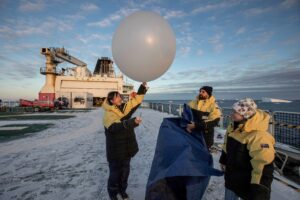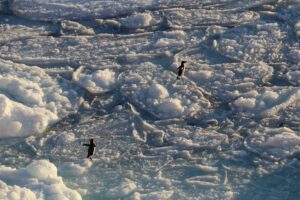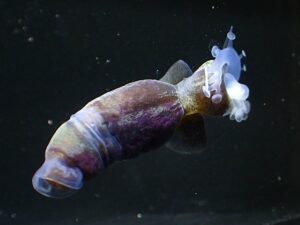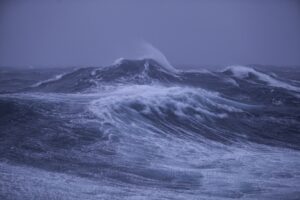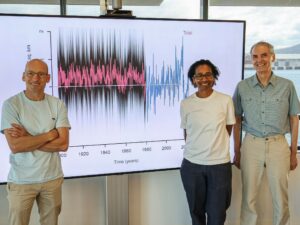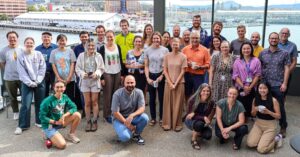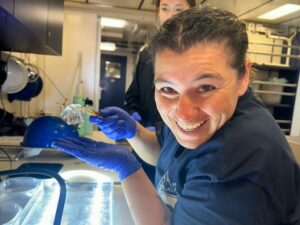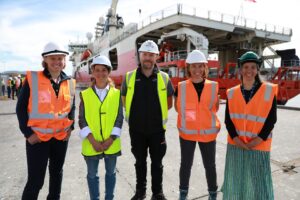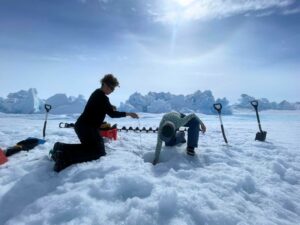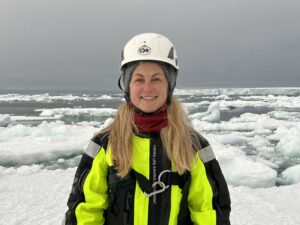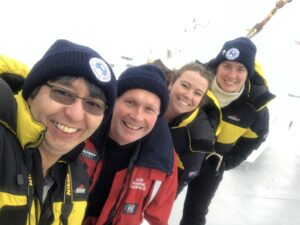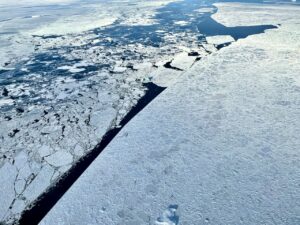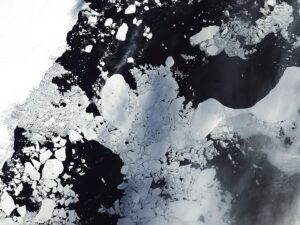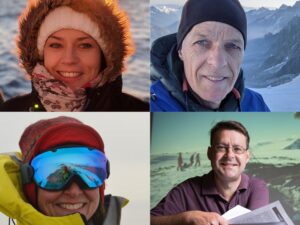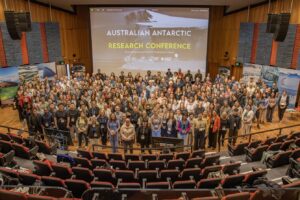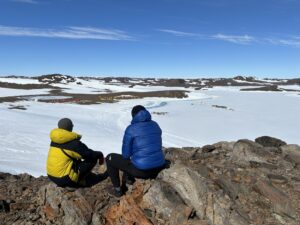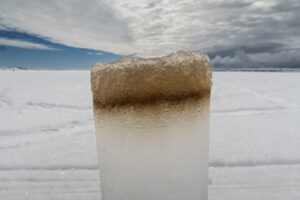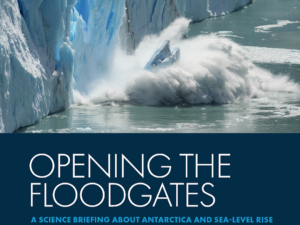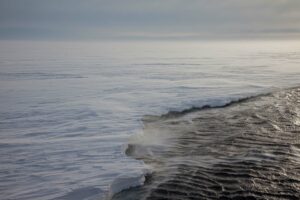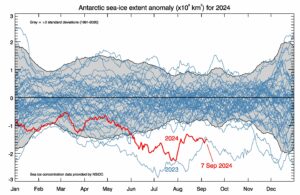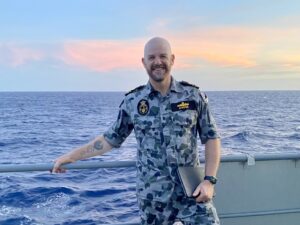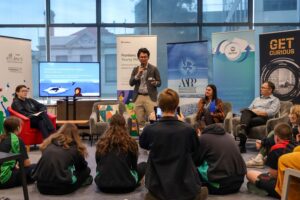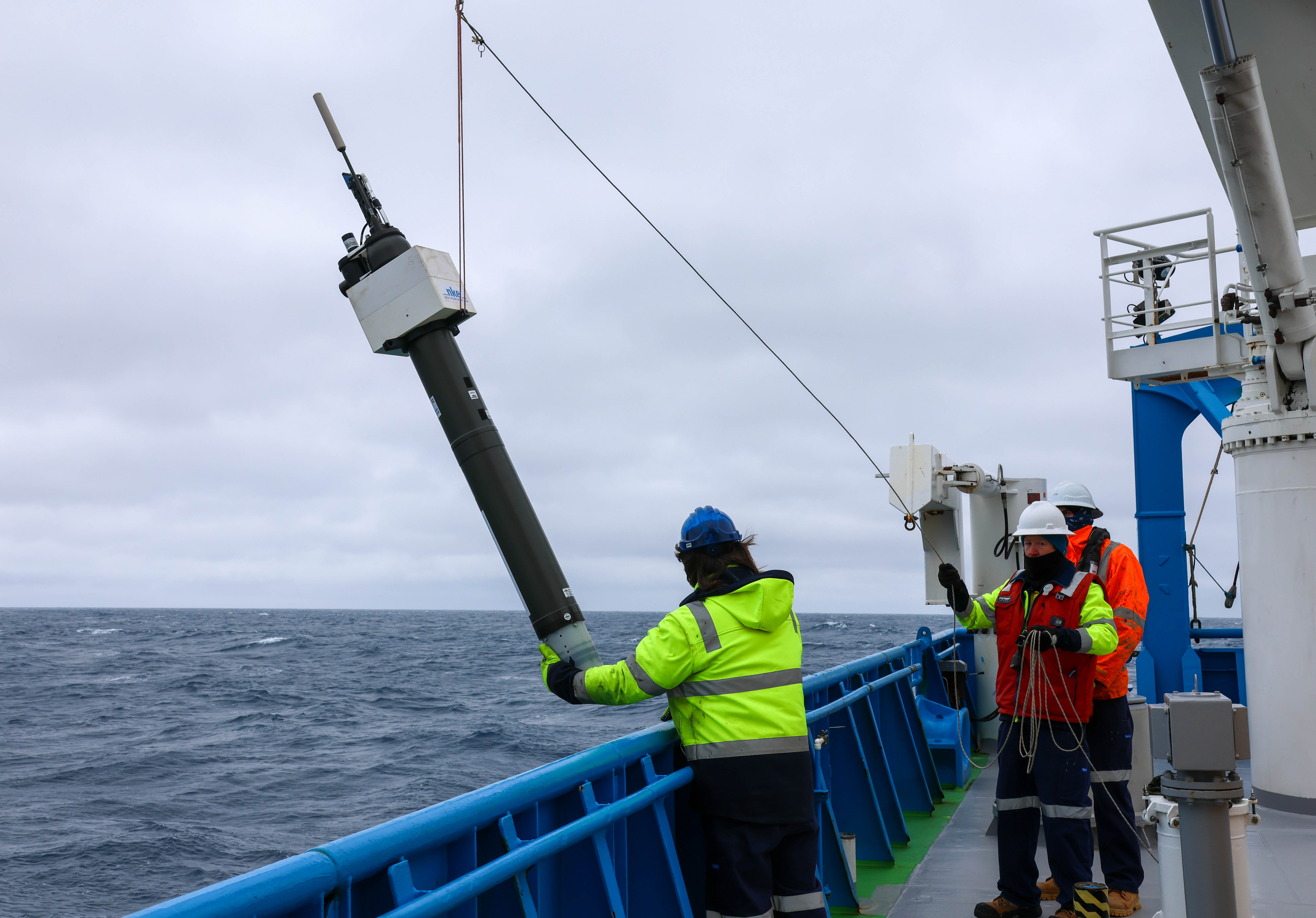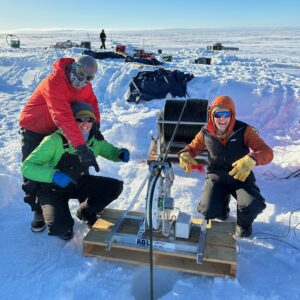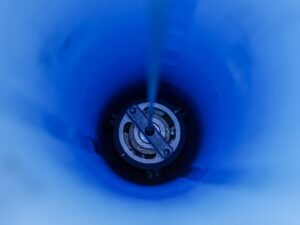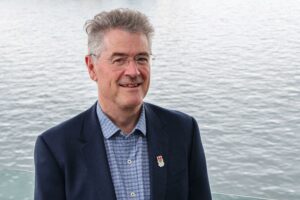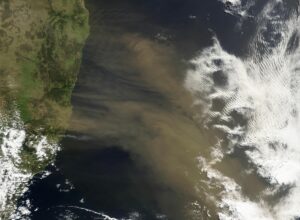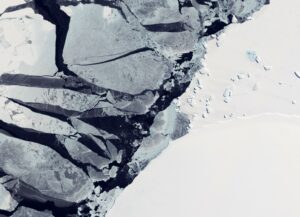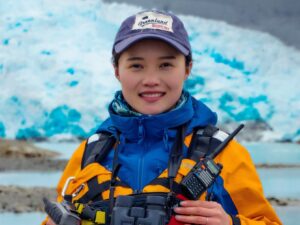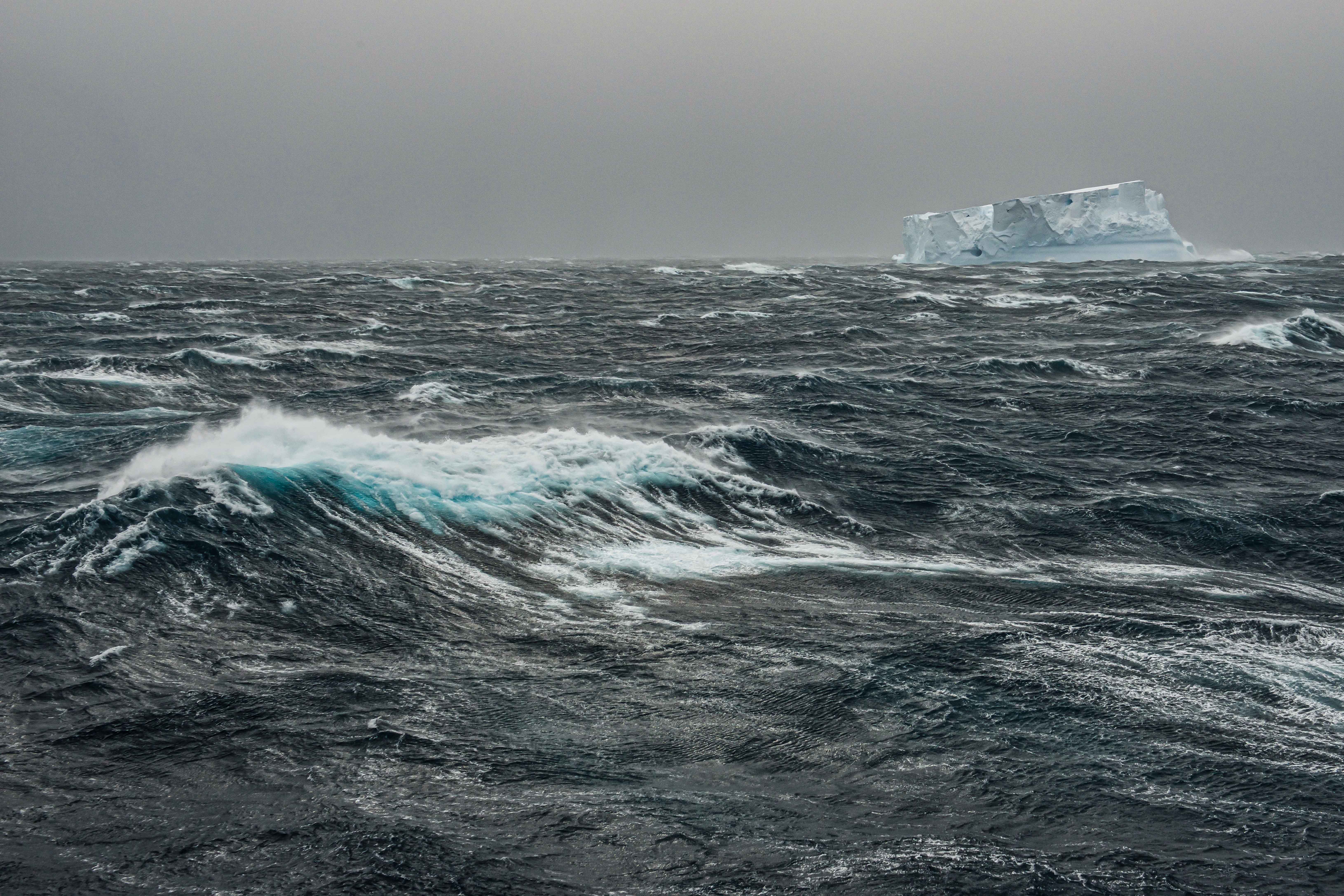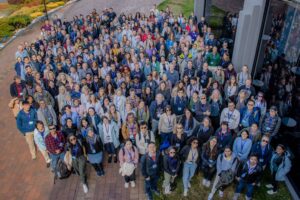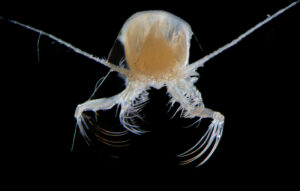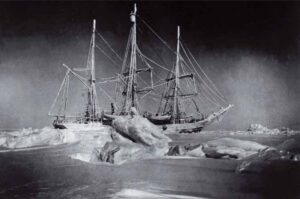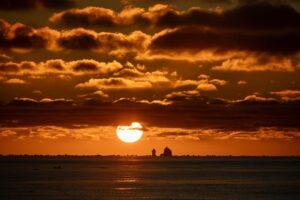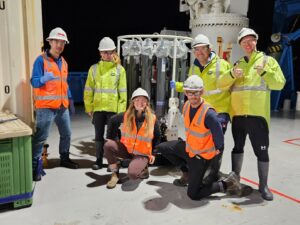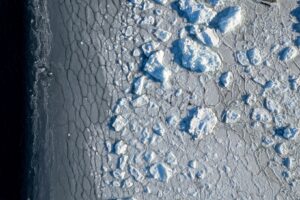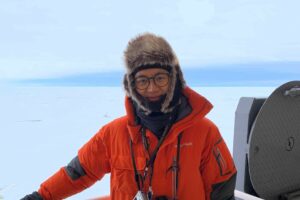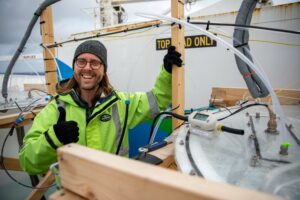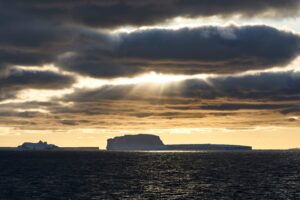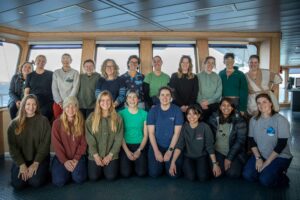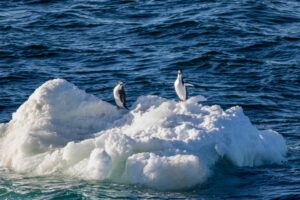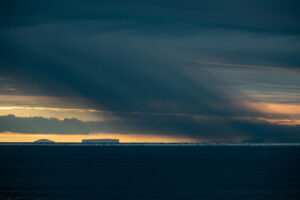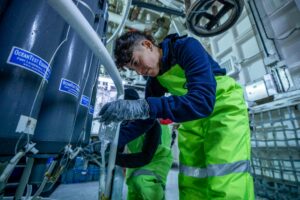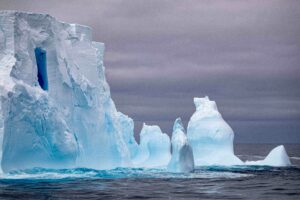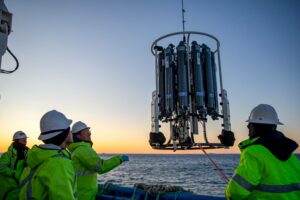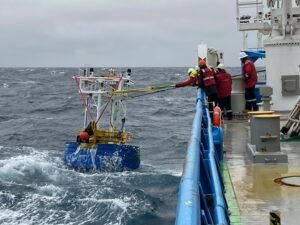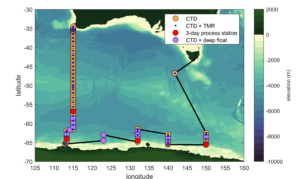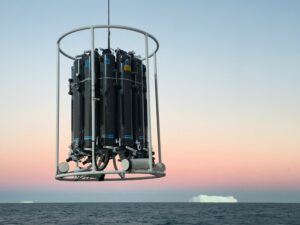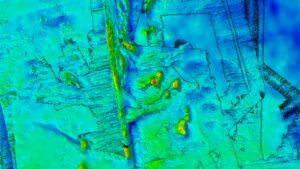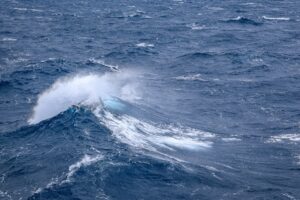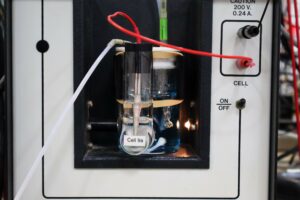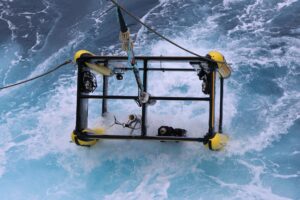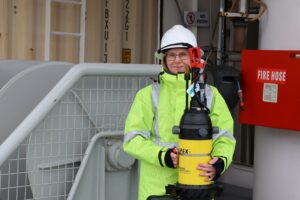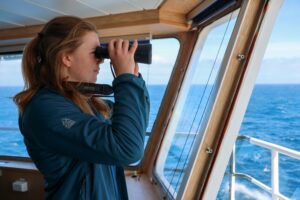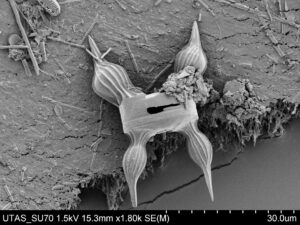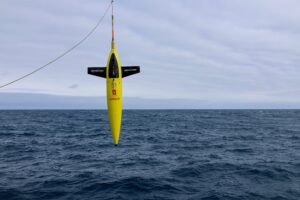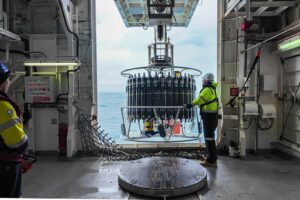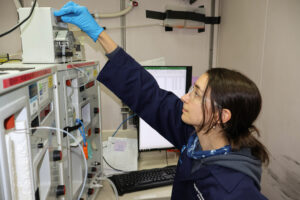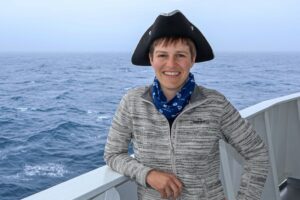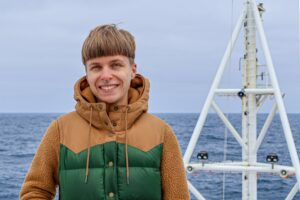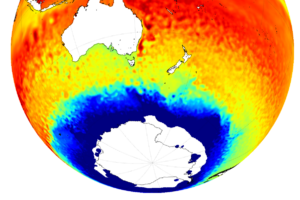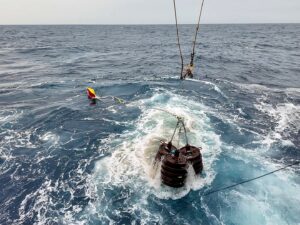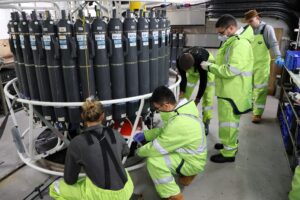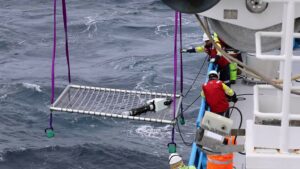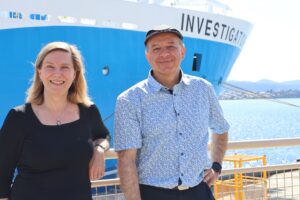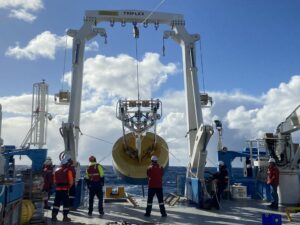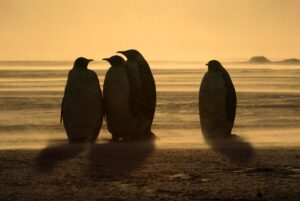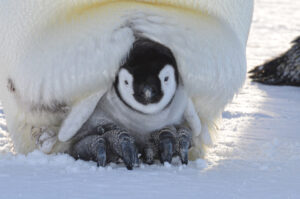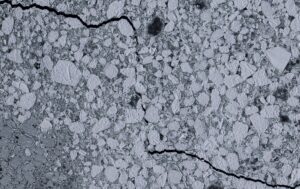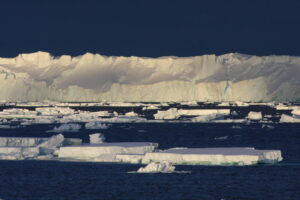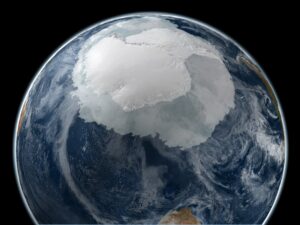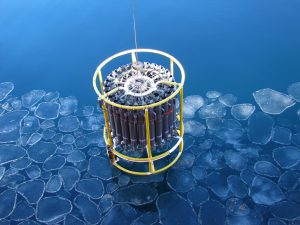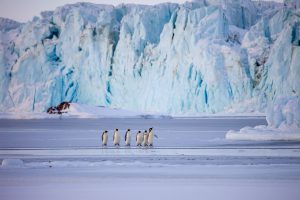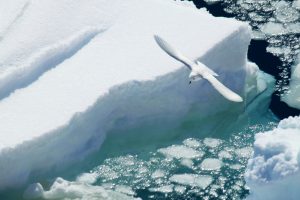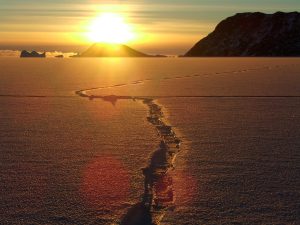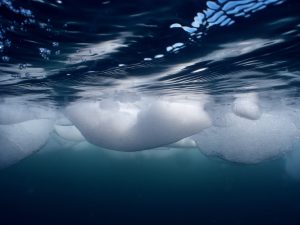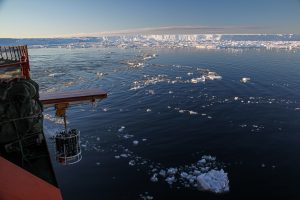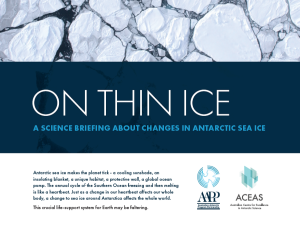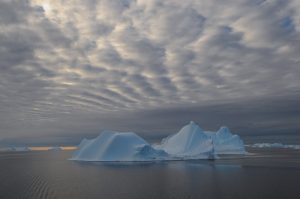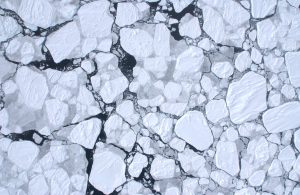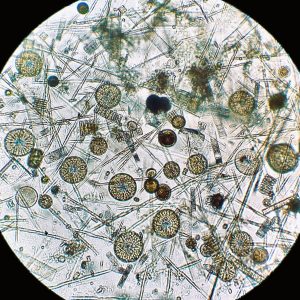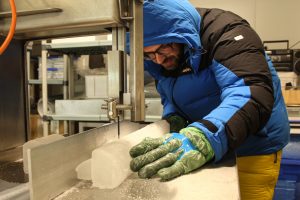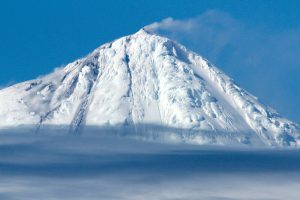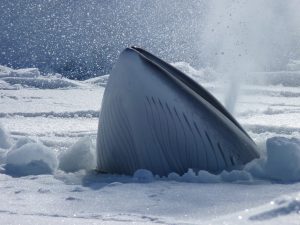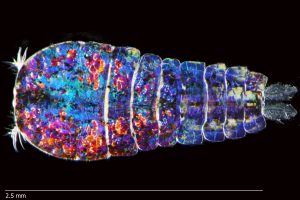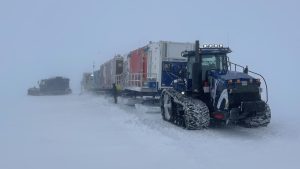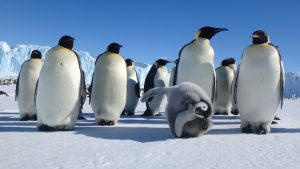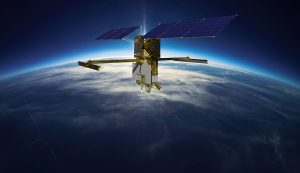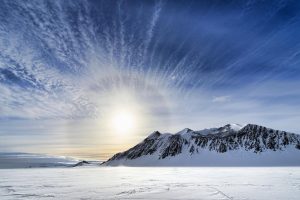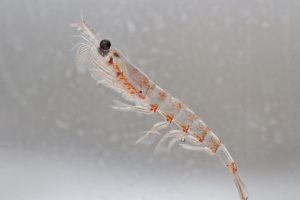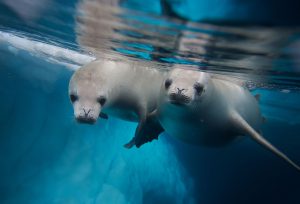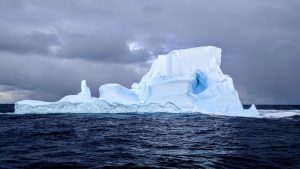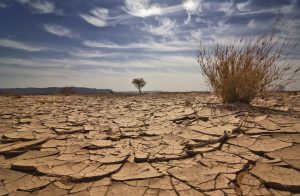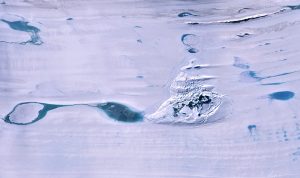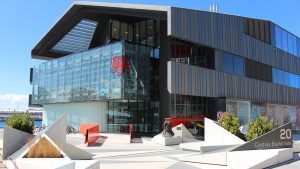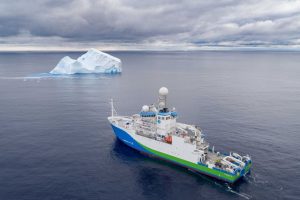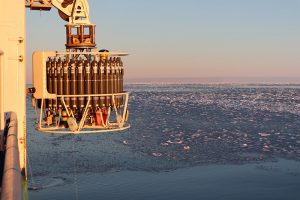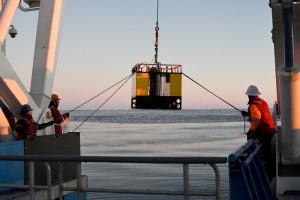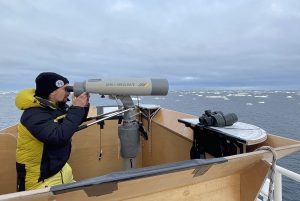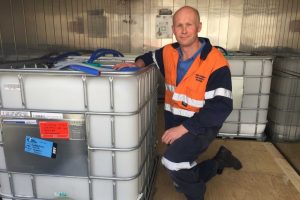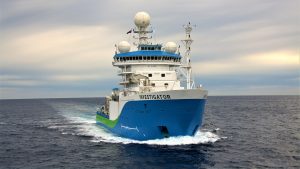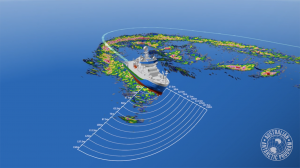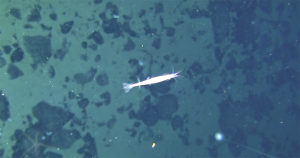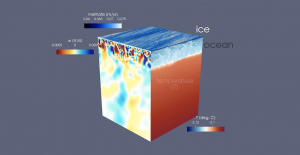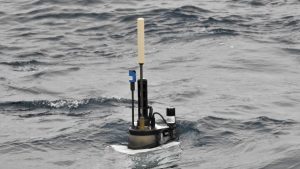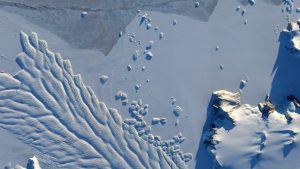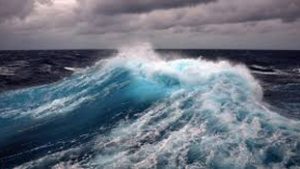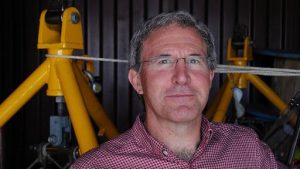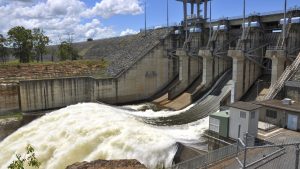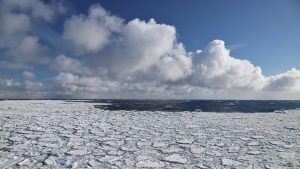NEWS
Tasmanian scientist in NASA mission to track ice with space lasers
First spaceborne laser altimeter system to monitor the impacts of climate change on terrestrial ecosystems and ice simultaneously
Read More East Antarctic ‘sea ice factory’ revealed as unexpected global current driver
A surprising source of deep-ocean ventilation in East Antarctica, with implications for global ocean currents and climate systems
Read More Expanding robotic float numbers a win for Australia’s ocean and climate insights
A step-change in our understanding of marine ecosystems, carbon cycling, fisheries, and how the ocean responds to climate change
Read More Adrift like Shackleton: Robot float survives Antarctic ice
An amazing story of the little float that could – and what it means for global sea level rise
Read More NASA eye in the sky to focus on Southern Ocean
International research community values ocean colour data from PACE satellite
Read More Unlocking how iron shapes ocean life and climate
Biogeochemistry team win ARC Discovery Project grant to iron out wrinkles in climate models
Read More Rising star: excellence in ice-sheet research recognised
National award for Antarctic researcher
Read More Antarctic research shared with Australian politicians and policymakers
Keeping Antarctica and the Southern Ocean front-of-mind for decision-makers
Read More Australia and Japan launch plan for joint Antarctic research
Japan and Australia working together in Antarctica and the Southern Ocean
Read More Antarctic science underpins national assessment of climate risk
A rapidly changing Antarctica will drive some of the major impacts on Australia in the next 25 years
Read More Abrupt Antarctic changes could have ‘catastrophic consequences for generations to come’, experts warn
Changes in Antarctica from global heating will impact entire planet
Read More Antarctic ice-sheet research lauded by ‘Tall Poppy’ award
Early career researcher with AAPP recognised for science impact and communication
Read More “More than the sum of its parts”: Japan-Australia brains-trust charts future for Antarctic science
Scientists plan joint research projects in Antarctica and Southern Ocean
Read More Japanese-Australian collaboration valuable for Antarctic early career researchers
How international Antarctic partnerships benefit the life and work of researchers
Read More Oceanographer calls for deeper Japan-Australia science partnership to address Antarctic climate risks
“The advances we can make together are much greater than we can make individually”: resolving uncertainties in global sea level rise
Read More Shifting foundations of the Antarctic food web
“We may be witnessing a fundamental reorganisation of life around Antarctica": study tracks change in polar phytoplankton
Read More “We are addressing a critical challenge”: the future of marine ecosystem modelling
Tracking and projecting how our oceans respond to climate change
Read More Antarctic atmospheric aerosols: tiny particles with global effects
Why it's important to understand clouds over the Southern Ocean
Read More Antarctic summer sea ice: Global impacts of extreme lows
First synthesis of global impacts from Antarctic summer sea-ice loss
Read More Securing Antarctic research: the ’roundabouts’ of science funding
Opinion piece by Prof Nathan Bindoff on the need for change to the system of funding Australian polar research
Read More Royal Society of Tasmania medal for sea-ice researcher
AAPP researcher wins prestigious award
Read More Uncovering cadmium in the Southern Ocean
On the trail of cadmium from Western Australia to Antarctica
Read More All part of the process: biology meets chemistry off an ice shelf
Revealing the drivers of phytoplankton growth, their role in carbon cycling, and dynamics between ocean, seafloor and ice shelves
Read More ‘Twilight zone’ migrants moving carbon in the Southern Ocean
Each night trillions of zooplankton and small marine creatures move from the ocean deep to the surface and back, in the largest animal migration on Earth
Read More Moorings: Sentinels to monitor ocean heat when we’re not there
Like weather stations for the sea, the Denman Marine Voyage has installed three moorings off the ice shelf to monitor ocean heat
Read More ‘Vast unseen meadow’: Annual growth of sea-ice algae measured
Covering more than twice the area of Australia at its winter peak, Antarctic sea ice is one of the largest biomes on Earth, providing critical habitat for ice algae
Read More Southern Ocean Time Series: Caring for your sediment trap
A behind-the-scenes look at how sediment traps are prepared for a year in the deep ocean
Read More Diving deep: Exploring the Denman Glacier with CTDs
How our scientists are tracking warm currents in ocean waters thousands of metres deep
Read More Antarctica’s hidden water flows are accelerating sea-level rise
Hidden water flowing beneath the Antarctic Ice Sheet plays a much bigger role in ice loss than current models assume
Read More Looking up: Tracing the secrets of Southern Ocean clouds
While oceanographers plumb the depths, atmospheric scientists on the Denman Marine Voyage look skywards
Read More Into the ice (or not)
Low sea-ice cover means the Denman Marine Voyage can access places no humans have been before
Read More It’s the little things that count
On the Denman Marine Voyage, the plankton team is busy collecting tiny creatures with the ‘wet well’ on icebreaker RSV Nuyina
Read More “Dream experiment”: Antarctic voyage a depth gauge for future sea-level rise
As an oceanographer, I’m excited about the prospect of getting ocean, ice and climate data from a region where few observations have been collected
Read More ‘Structural change’: no new steady state for Antarctica’s sea-ice system
The first monthly reconstruction of Antarctic sea-ice extent by sector and in total for the entire 20th century
Read More “What’s driving the changes we’re seeing?”: Research voyage heads to Denman glacier
First opportunity for Australian marine research into one of East Antarctica's most rapidly retreating glaciers
Read More Teaching opportunities for PhD students through international collaboration
Two AAPP PhD students travel from Western Australia to New Zealand on a German research vessel
Read More First marine science voyage to probe vulnerable Antarctic glacier
A two-month mission exploring the Denman Glacier region about 5,000 kilometres south of Australia
Read More Tracing the pathways of warmer waters melting ice shelves
Join our scientists in East Antarctica as they explore underneath a floating ice shelf with a power tool, a long drill, lots of line — and plenty of stamina.
Read More Shedding light on Antarctic ice algae in a changing climate
AAPP PhD candidate wins SCAR Fellowship to research sea-ice algae in Norway
Read More Sink or swim: Carbon transport by Antarctic krill
New observations reveal details of the contribution of Antarctic krill to carbon transport in the Southern Ocean
Read More Revealing Antarctica’s underbelly: Ocean climatology under sea ice
Sea ice is a natural barrier to measuring water temperature and salinity of the ocean around Antarctica.
Read More Knut confirmed
Knut Heinatz researches the impact zooplankton can have on the ocean’s ability to store atmospheric carbon.
Read More “Exclamation point”: Ice-shelf collapse signals East Antarctic instability
Was the collapse of the Conger-Glenzer ice shelf in 2022 an early warning sign for East Antarctica?
Read More Research funding to build knowledge on critical climate challenges
Climate-related Antarctic research wins Discovery Project grants
Read More Our Science, Your Future: Next Generation of Antarctic Scientists Call for Collaborative Action
A statement from early-career researchers at the inaugural Australian Antarctic Research Conference
Read More Hundreds gather for emergency summit on Antarctica’s future
Nearly 500 polar experts meet for inaugural Australian Antarctic Research Conference
Read More Carbon capture: World-first study of algal growth in Antarctic fast ice
How much carbon is produced annually by algae in Antarctic fast ice?
Read More New leader for Antarctic research program
Sea-ice expert the next leader of the Australian Antarctic Program Partnership
Read More Opening the floodgates: Will Antarctica reshape the world?
AAPP/ACEAS briefing paper sent to Australian politicians and policymakers
Read More Taking temperature: how well do weather models simulate Antarctic sea ice?
First research comparing how well Antarctic sea-ice surface temperature is represented in six commonly used weather models
Read More Antarctic ocean scientist wins Tasmanian ‘Tall Poppy’ award
Antarctic research recognised by Australian Institute for Policy and Science
Read More Double dip: Antarctic sea ice sinks to new low for winter
For the second winter in a row, the extent of Antarctic sea ice has been exceptionally below average — and it has just set a new record low for this time of year.
Read More Research awards for Antarctica in a changing climate
Antarctic and Southern Ocean science features in Tasmanian DECRA awards from Australian Research Council
Read More Antarctic sea ice research wins award from Chief of Defence Force
Fellowship to assist naval oceanograper and meteorologist to complete PhD
Read More Stay frosty: Antarctic science for kids, reviewed by kids
Special collection of scientific articles launched in National Science Week
Read More Under the pump: robot floats probe carbon pathways in the Southern Ocean
Combining observations from robotic floats and sediment traps to track carbon flows
Read More How to drill an ice shelf — and why
Join the adventure as a small science team investigates a massive ice shelf in Antarctica — and what it means for the rest of the world
Read More Of ice and fire: study of sea salt in Antarctic snowfall reveals Australia may be under-estimating bushfire risk
The remarkable link between ice cores and severe fire weather
Read More University wins $3.4 million for precision climate tracking project
Monitoring the response of oceans and water cycle to reducing carbon emissions
Read More Windblown dust from land boosts productivity in the Southern Ocean
One-third of Southern Ocean biological activity fertilised by iron-rich dust blown from land
Read More Australian Antarctic scientists in bid for NASA space mission
Next-generation satellite plan for monitoring sea ice and glaciers in unprecedented detail
Read More AAPP researcher to showcase ice sheets at climate change conference
Ice sheet modeller wins award from Australian Academy of Science
Read More Life in the Southern Ocean: cooling the planet while coping with climate change
AAPP-led studies on the future of Southern Ocean ecosystems in a changing world
Read More Conference statement: Zooplankton research priorities for a changing world
A global conference of zooplankton experts from 38 countries sets out urgent research priorities
Read More Small but mighty: Marine zooplankton bring global meeting to Hobart
More than 340 scientists from 38 countries meet in Hobart about marine zooplankton
Read More A visual expedition to Antarctica’s past — and a clue to its future
What the voyage of the Belgica tells us about how Antarctic sea ice has changed in 120 years
Read More From carbon to clouds: Ocean detectives return with climate clues
Epic voyage comes home with one of the most comprehensive datasets ever collected in the Southern Ocean
Read More Trace metal team makes half-century
Hard-working voyagers reach a milestone in the Southern Ocean
Read More Good things don’t come in threes for Antarctic sea ice
New AAPP-led research points to fundamental changes taking place in the Antarctic sea-ice system with immense global implications
Read More AAPP sea-ice scientist wins global glaciology award
AAPP researcher Dr Pat Wongpan receives 2023 Early Career Scientist Award from International Glaciology Society
Read More ‘MISO-cosms’: a miso soup unlike any other
Creating a miniature Southern Ocean for shipboard experiments on the links between biology and cloud formation
Read More Super-cool clouds, iron-starved plankton and vanishing deep water
What does a changing Southern Ocean mean for climate?
Read More Women of the MISO voyage
Celebrating the International Day of Women and Girls in Science aboard a research vessel in the Southern Ocean
Read More Life-cycle of an Antarctic cloud
How the biology of the Southern Ocean is linked to the clouds in the atmosphere
Read More Tasting the many flavours of Antarctic ocean
Using the CTD to track change in the Southern Ocean and what it means for biological productivity and the future of the Antarctic Ice Sheet
Read More In search of Antarctic Bottom Water
Venturing to the Adélie Depression, chasing the world's densest water that drives currents around the planet.
Read More Tracing the metals that power the carbon pump
Sampling vanishingly low concentrations of trace metals, to understand what controls Southern Ocean biology and its connection to the carbon cycle and climate.
Read More Down the sink: Following carbon in the Southern Ocean
AAPP PhD study extends carbon exchange records for Southern Ocean Time Series station to cover two decades.
Read More How to measure an ocean?
Why the MISO voyage is travelling across the Southern Ocean from Hobart to Fremantle via the Antarctic ice edge.
Read More From clouds to the deep: 60-day voyage probes Southern Ocean change
Voyage to investigate why deep ocean currents near Antarctica are slowing, whether the Southern Ocean will continue to absorb heat and carbon dioxide, and the formation of clouds.
Read More Oceanography, seafloor mapping and satellite combine to explore world’s strongest current
From space to the seafloor, an Australian and international research voyage has mapped a highly energetic ‘hotspot’ in the world’s strongest current simultaneously by ship and satellite, and uncovered an underwater mountain range.
Read More Ode to FOCUS 23
A gallery of images and words by Bill Martin, Electro-Technical Officer on RV Investigator.
Read More To find carbon, look in the ocean
The largest reservoir of carbon on our planet is the ocean. Craig Neill is testing an old carbon analyser against his new design.
Read More Triaxus in tow
The Triaxus 'flies' through the upper ocean as it is towed behind the ship while the SWOT satellite records the height of the sea surface.
Read More Temperature, salinity…and the need for speed
With EM-APEX floats measuring current velocity, what can they tell us about changes in the Southern Ocean?
Read More Soaring on salty winds
Death glares from giant petrels, squadrons of great cormorants, fly-bys from fulmars, A-list of albatross: never a dull moment in the Southern Ocean
Read More Snap-frozen salad from the Southern Ocean
Understanding how communities of phytoplankton and marine microbes are changing and what this could mean for the storage of carbon
Read More Robot gliders cruise the currents
Three underwater gliders are released into the world's strongest water flow, the high-energy Antarctic Circumpolar Current
Read More The FOCUS 42.2 marine marathon
What to do when a mad-keen trail-runner is on a research ship for 38 days? Run a marathon on a treadmill, of course!
Read More The CTD: What goes down, must come up
One item in our oceanographic toolkit gets more of a workout than others. Which is it and what does it tell us about the deep ocean?
Read More Meet Hydrochem: our floating lab
At the heart of this science ship is an advanced analytical lab for measuring the vital signs of the ocean
Read More For the sheer excitement of being here
PhD student Andie Hay offers her thoughts about life on the high seas – and a poem
Read More Living the oceanographic dream
PhD student Polina Sholeninova about her experience living and working at sea on the FOCUS voyage
Read More From big things, little things grow
Why are we studying a patch of the Southern Ocean just 100km wide and 200km long so intensively?
Read More How to build a tall mooring
Crew and scientists on CSIRO research vessel RV Investigator install an oceanographic 'weather tower' in the Antarctic Circumpolar Current
Read More We’re in the zone
The FOCUS voyage has now reached our survey area about 850 nautical miles south of Hobart (or 200nm west of Macquarie Island, halfway between Tasmania and Antarctica).
Read More Deep-sea diving probe recovered from Southern Ocean
A state-of-the-art robotic float has been recovered from the Southern Ocean, in a first for CSIRO research vessel Investigator.
Read More Voyage to Southern Ocean ‘hotspot’ probes how planet’s strongest current helps melt Antarctic ice
Scientists head for the heart of the Antarctic Circumpolar Current to investigate how it leaks warm water into polar seas.
Read More AAPP scientists bring Antarctic focus to ARC funding
Four key projects involving AAPP researchers have been approved in the latest round of funding by the Australian Research Council.
Read More Increasing atmospheric carbon amplifies seasonal CO2 cycle in Southern Ocean
For the first time, scientists measure an increase in the magnitude of the Southern Ocean’s seasonal cycle of carbon dioxide over the last decade.
Read More Sea change: a new blueprint for Southern Ocean survival
More than 200 scientists from 19 countries create the first comprehensive assessment of trends in Southern Ocean ecosystems, in a report written specifically for policy makers.
Read More More than just ice: What makes the best address for an emperor penguin colony?
A new study of the habitat needs of emperor penguins show that the iconic seabirds are more flexible in their abilities to choose a place to live than previously assumed.
Read More Failure to freeze: Low Antarctic sea ice may be ‘new abnormal’
The first evidence is emerging of a regime shift underway in the Southern Ocean where Antarctic sea ice is entering a different state of lower coverage.
Read More Helicopters track warm ocean water melting Totten Glacier ice shelf
Probes dropped from helicopters through ice cracks help reveal that warm ocean water is melting the largest glacier ice shelf in East Antarctica from below.
Read More Antarctic researchers land prestigious DECRAs in Tasmania
Researchers with the Australian Antarctic Program Partnership awarded two of four DECRAs to Tasmania
Read More Urgent call for Southern Ocean science in a changing world
Hundreds of international scientists are sounding a clarion call for urgent expansion of Southern Ocean science in the emerging climate crisis.
Read More Antarctic sea ice scientist wins Future Fellowship grant
Landfast ice is crucial for the Earth's climate
Read More Eyes of the world on Southern Ocean
More than 250 people from 25 nations will meet in Hobart during August for the first-ever global conference of the Southern Ocean Observing System (SOOS).
Read More New study of Antarctic landfast ice charts dramatic crash
The first-ever broad review of Antarctic ‘landfast’ ice highlights its far-reaching importance in the Earth system while documenting a recent dramatic crash in its extent.
Read More Polar scientists call for urgent action in view of rapid Arctic and Antarctic change
Polar scientists are calling for an urgent intensification of national and international research and observational capabilities in view of rapid Arctic and Antarctic change.
Read More Antarctic deep ocean currents have slowed in the past three decades
Researchers have found that the deep ocean circulation around parts of Antarctica has slowed by 30 per cent since the 1990s, reducing oxygen levels across the world’s deep seas.
Read More Science briefing: ‘On Thin Ice’
Is this sudden shift in the Southern Ocean a response to climate change? We need to know how the Antarctic system is changing – and why.
Read More Shining sunlight on the Southern Ocean with machine learning
Using Artificial Intelligence to better simulate the amount of energy from the sun that strikes the Southern Ocean.
Read More Antarctica’s heart of ice has skipped a beat. Time to take our medicine
Sea-ice researchers join forces to release a science briefing for policy makers.
Read More Seeding clouds: the power of partnerships in Antarctic research
Not only do tiny phytoplankton have a big impact on clouds, they also play a crucial role in the climate system
Read More New ice core lab to analyse million-plus years of climate history
Through the Million Year Ice Core project, Tasmania is gaining an entirely new climate research capability at the Institute for Marine and Antarctic Studies in Hobart.
Read More Southern Ocean volcanoes under the microscope at Australia’s Synchrotron
What does Antarctic ice, Southern Ocean algal blooms, Australia’s active volcanoes and a particle accelerator have in common?
Read More Deep freeze falters: Antarctic sea ice drops to new low
With three very extreme events of Antarctic sea ice loss in the last six years, it appears a regime shift is under way in the Southern Ocean.
Read More New Antarctic map builds on forty years of sea ice data
A new interactive Antarctic map called 'Nilas' promises to assist voyage planning and enhance climate research in the sea-ice zone.
Read More Mind the gaps: marine zooplankton futures in a warming world
A global review about the impacts of warming oceans on marine zooplankton is published in Nature Communications.
Read More Antarctic science leader awarded Order of Australia
Prof Tony Press honoured for distinguished service to the environment
Read More Trail-blazing tractor trains on track for million-year-old ice site
MEDIA RELEASE: The first traverse for the Million Year Ice Core project is well advanced in proving a route for ambitious climate research in the coming years.
Read More Antarctica’s emperor penguins could be extinct by 2100 – and other species may follow if we don’t act
Greater conservation efforts are needed to protect Antarctic ecosystems, and the populations of up to 97% of land-based Antarctic species could decline by 2100 if we don’t change tack, new research has found.
Read More SWOT team zooms in on Southern Ocean from space
MEDIA RELEASE: An advanced new satellite to observe water on Earth in unprecedented resolution promises to revolutionise Australian research in the Southern Ocean.
Read More Key Antarctic research awarded ARC Discovery grants
MEDIA RELEASE: Innovative research on Southern Ocean productivity and sea ice by the Australian Antarctic Program Partnership (AAPP) will be advanced with three Australian Research Council (ARC) Discovery projects.
Read More Antarctic marine life under pressure
The Convention on the Conservation of Antarctic Marine Living Resources (CCAMLR) convened in Hobart, Tasmania, during October 2022 to examine the state of marine life in the Southern Ocean. Professor Bettina Meyer (AWI) and Dr So Kawaguchi (AAD) published a Science editorial stressing the need for a new krill management strategy at the Antarctic Peninsula to ensure the balance of the Southern Ocean ecosystem.
Read More Antarctica and the Southern Ocean: insights from the 2022 IPCC WGII report
The Australian Antarctic Program Partnership (AAPP) and the Australian Centre for Excellence in Antarctic Science (ACEAS) have released a report on IPCC WGII key findings for Antarctica and the Southern Ocean.
Read More Study exposes role of sea ice in protecting Antarctic coast
Media Release: A new method for detecting and monitoring change in the exposure of the Antarctic coastline to the dynamic Southern Ocean, due to changing sea-ice distribution, could improve environmental monitoring and modelling of Antarctic ice loss and sea level rise.
For the first time, Dr Phil Reid of the Australian Bureau of Meteorology and Dr Rob Massom of the Australian Antarctic Division investigated ‘coastal exposure length’ – a daily measure of when and where the Antarctic coastline lacks any protective sea-ice buffer offshore.
The scientists used the long-term satellite sea-ice concentration record to determine Antarctic coastal exposure, and how it has changed over the past four decades.
Read More Antarctic ice cores reveal Australian drought risk worse than thought
Media Release: Antarctic ice core records have shown that eastern Australia’s drought risk is greater than thought.
The research, led by Dr Tessa Vance from the Australian Antarctic Program Partnership and Dr Anthony Kiem from the University of Newcastle, and involving Australian Antarctic Division scientists, has significant implications for water security and management across Australia and internationally.
Read More Scientists detect sudden loss of large Antarctic lake
Media Release: Scientists in Australia and the United States are reporting the sudden loss of a large ice-covered Antarctic lake which held more water than Sydney Harbour.
Read More PhD Opportunities at AAPP
The Australian Antarctic Program Partnership is now offering exciting PhD research projects, based at the University of Tasmania in Hobart.
Read More Krill research voyage ends in success
Media Release: The Australian Antarctic Program Partnership (AAPP) has welcomed the successful completion of a major krill research voyage into the Southern Ocean.
Read More Why we study the ocean depths
Why do oceanographers send scientific instruments thousands of metres below the ocean surface?
Read More Dreams come true!
Our researchers on board TEMPO sprang into action, when an unusually long and thick krill swarm appeared on the echogram.
Read More Meet the Predator Observers
The Predator Observer team has recorded 445 sightings of marine mammals.
Read More ABC Radio interviews Dr Rob King
'The entire vessel is on a port list, because we're being hit by a 40 knot wind that's screaming down off Antarctica… it's pretty spectacular!'
Read More Welcome Aboard TEMPO: Voyage Blog
The Southern Ocean Large Areal Carbon Export voyage is now underway, aboard Australia's RV Investigator.
Read More Eye-to-eye with a krill swarm
For decades scientists have wondered how the Antarctic krill population is distributed under the shield of Antarctic winter sea ice and the development of the KOMBI provides an opportunity to gain valuable clues at a time when humans cannot readily access this area.
Read More KOMBIs away!
For decades scientists have wondered how the Antarctic krill population is distributed under the shield of Antarctic winter sea ice and the development of the KOMBI provides an opportunity to gain valuable clues at a time when humans cannot readily access this area.
Read More TEMPO in transit
All the years of preparation to make this voyage a reality are now bearing fruit - or in this case krill.
Read More Supercomputers simulate Antarctic ice shelf melting
High-powered physics and supercomputers are helping a team of Australian-based scientists explore the mysterious boundary between Antarctic ice and the Southern Ocean.
Read More Getting the measure of krill
Media Release: Australian Antarctic Program scientists will use a range of novel technologies to measure krill, during a ground-breaking voyage to the Southern Ocean that departs tomorrow.
Read More Welcome Aboard SOLACE: Voyage Blog
The Southern Ocean Large Areal Carbon Export voyage is now underway, aboard Australia's RV Investigator.
Read More Robot fleet dives for climate answers in ‘marine snow’
A fleet of new-generation, deep-diving ocean robots will be deployed in the Southern Ocean, in a major study of how marine life acts as a handbrake on global warming.
Read More Recent climate extremes have driven unprecedented changes in the deep ocean
New measurements reveal a surprising increase in the amount of dense water sinking near Antarctica, following 50 years of decline.
Read More New Ice Database Fills an Important Piece of Global Climate Puzzle
Researchers from the AAPP have completed another important piece of the Antarctic climate jigsaw puzzle, with the creation of the first detailed database of changes in land-fast sea ice.
Read More Going with the Wind – Our Changing Southern Ocean: Dr Edward Doddridge
Dr Edward Doddridge is an oceanographer and Theme Leader with AAPP's Nature and Impacts of Southern Ocean Change research theme. Dr Doddridge was recently invited to present at the Royal Society of Tasmania
Read More The Role and Response of the Southern Ocean in a Warming World: Prof. Stephen Rintoul
AAPP Theme Leader Prof. Stephen Rintoul was recently invited to present at the SCAR 2020 Mini Symposium entitled Antarctica in a Warming World; Regional Changes, Global Consequences and Future Commitments.
Read More Antarctic ice cores are reshaping Australia’s climate assumptions
From Antarctic ice, a new understanding of drought & flood risk in Australia
Read More The powerful but puzzling role of Southern Ocean clouds
Atmospheric research by the AAPP is helping to address urgent questions about the role of Southern Ocean clouds in the Earth’s changing climate.
Read More Tasmanian scientist in NASA mission to track ice with space lasers
First spaceborne laser altimeter system to monitor the impacts of climate change on terrestrial ecosystems and ice simultaneously
Read More East Antarctic ‘sea ice factory’ revealed as unexpected global current driver
A surprising source of deep-ocean ventilation in East Antarctica, with implications for global ocean currents and climate systems
Read More Expanding robotic float numbers a win for Australia’s ocean and climate insights
A step-change in our understanding of marine ecosystems, carbon cycling, fisheries, and how the ocean responds to climate change
Read More
